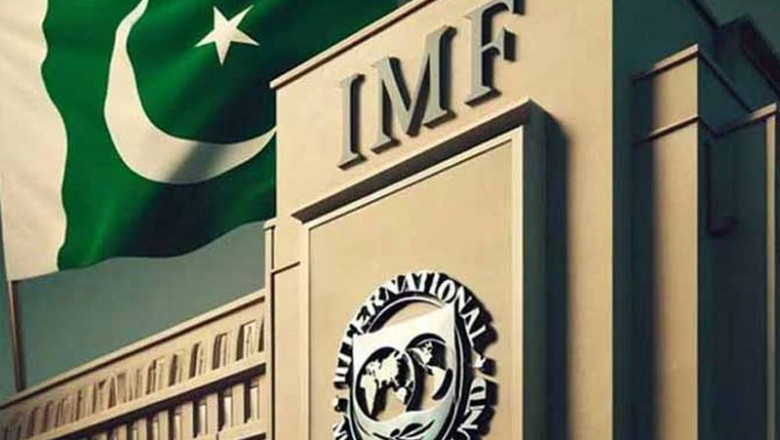views
The International Monetary Fund (IMF) has issued a cautionary note to Pakistan, stating that increasing hostilities with neighboring India could significantly hinder the country’s fragile economic reform agenda. The warning comes amid escalating political and military tensions between the two South Asian nuclear powers, which have historically affected regional stability and economic planning.
IMF Concerns: Reputation and Institutional Risks
According to the IMF, the ongoing and potentially worsening standoff between Pakistan and India could lead to what it termed “institutional” and “reputational” risks. These terms imply that the perception of mismanagement, misuse of international aid, or diversion of resources away from development goals could surface if hostilities grow further. Such a situation might also erode investor confidence and complicate Pakistan's negotiations with global financial bodies.
The IMF’s concern isn't solely diplomatic in nature—it is fundamentally economic. Conflict, even in its latent or cold phases, typically results in budget reallocations, with defense spending often increasing at the cost of development, infrastructure, education, and health. For a country like Pakistan, which is already struggling with soaring inflation, a weak rupee, and a heavy external debt burden, any disruption to the reform process could be disastrous.
Financial Lifeline Amid Political Tensions
The IMF recently approved a $1 billion disbursement to Pakistan under its Stand-By Arrangement (SBA). This comes as part of a broader $3 billion support package meant to stabilize the Pakistani economy, help with balance of payments, and support critical reforms. However, this tranche came under scrutiny during IMF meetings, especially from India, which objected to Pakistan’s eligibility for continued financial assistance due to concerns around alleged misuse and security issues.
India’s objections underscore the geopolitical tension that surrounds every international transaction involving these two countries. New Delhi reportedly questioned whether IMF funds could indirectly be used in ways that do not align with peaceful development, alluding to its ongoing accusations regarding cross-border terrorism. Though these claims were not officially endorsed by the IMF, they formed part of a broader debate on Pakistan’s governance and transparency.
New Conditions and the Challenge of Compliance
As part of the new financial arrangement, the IMF has laid out at least 11 new conditions that Pakistan must meet in order to receive future installments. These include structural reforms like increasing tax collection, reducing non-essential public expenditures, controlling inflation, and moving ahead with the privatization of loss-making state-owned enterprises.
These reforms are already challenging under normal circumstances. With rising military tensions in the background, the political appetite and administrative capacity to pursue such measures might diminish significantly. Any shift in government priorities toward national security and military spending could derail the pace of reforms, leading to delayed benchmarks and missed fiscal targets.
Pakistan’s Response: Confidence in Economic Stability
In response to the IMF’s concerns and international scrutiny, Pakistan Finance Minister Muhammad Aurangzeb struck a tone of cautious optimism. He emphasized that recent tensions with India have not yet severely affected the country’s economic trajectory. Speaking to reporters, he claimed that the military standoff had been "budgeted for" and expressed confidence in managing financial disruptions.
Aurangzeb also highlighted hopes for diplomatic easing, possibly through U.S.-led mediation, to avoid further escalation. He pointed to the importance of maintaining macroeconomic stability as the government prepares for the next fiscal year’s budget and looks toward further IMF support and other international funding.
Regional Stability: A Prerequisite for Economic Progress
Economic experts widely agree that long-term growth in Pakistan depends heavily on regional peace. Persistent conflict or even the constant threat of it not only discourages foreign investment but also diverts resources away from critical sectors like education, healthcare, and technology. With 2025 shaping up to be a pivotal year for South Asia’s economic trajectory, any misstep in diplomacy could undo months of financial planning.
Moreover, given that the IMF and other lenders such as the World Bank closely monitor geopolitical developments, Pakistan’s diplomatic relations will play a key role in its future financial viability. A return to frequent border clashes or another major diplomatic incident could lead to delays or even suspensions of foreign aid and loan agreements.
Conclusion
The IMF’s warning is a stark reminder of how deeply interconnected politics and economics have become for countries like Pakistan. While international financial institutions are committed to helping struggling economies, they also expect transparency, peace, and cooperation. For Pakistan, walking the tightrope between national security and economic revival is not just a matter of governance—it may define the country's future for decades to come.
Reference: پاکستان اور بھارت کے درمیان مزید کشیدگی سے معاشی اصلاحات متاثر ہوسکتی ہیں: آئی ایم ایف














Comments
0 comment